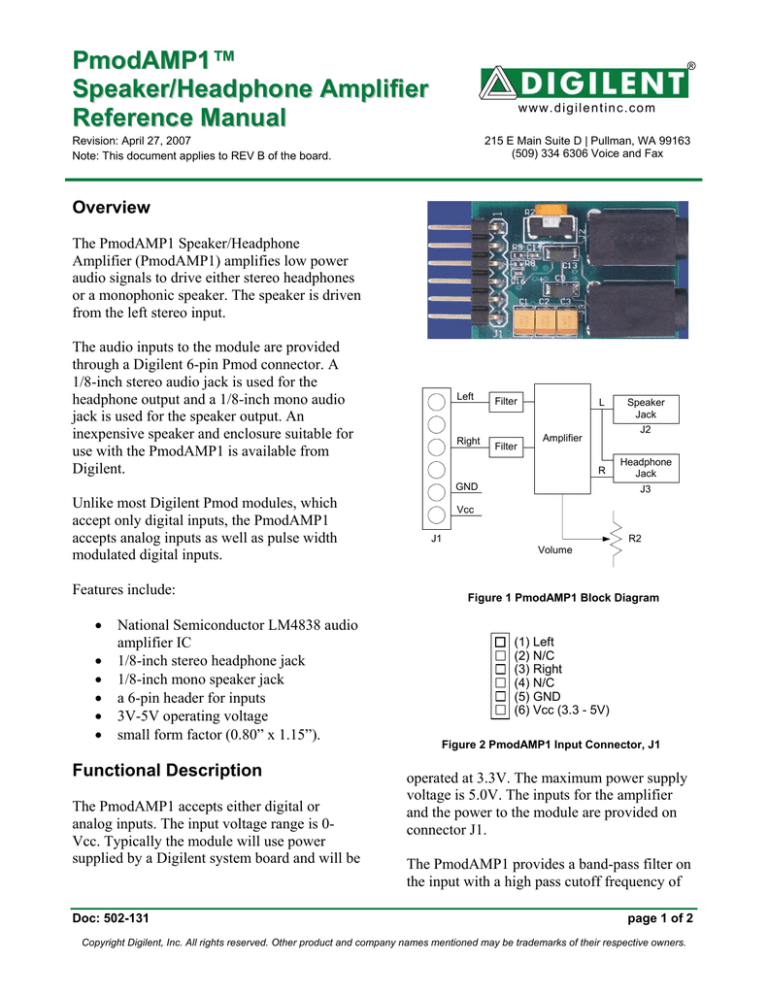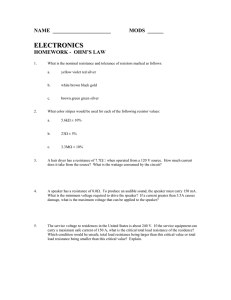
PmodAMP1™
Speaker/Headphone Amplifier
Reference Manual
®
www.digilentinc.com
215 E Main Suite D | Pullman, WA 99163
(509) 334 6306 Voice and Fax
Revision: April 27, 2007
Note: This document applies to REV B of the board.
Overview
The PmodAMP1 Speaker/Headphone
Amplifier (PmodAMP1) amplifies low power
audio signals to drive either stereo headphones
or a monophonic speaker. The speaker is driven
from the left stereo input.
The audio inputs to the module are provided
through a Digilent 6-pin Pmod connector. A
1/8-inch stereo audio jack is used for the
headphone output and a 1/8-inch mono audio
jack is used for the speaker output. An
inexpensive speaker and enclosure suitable for
use with the PmodAMP1 is available from
Digilent.
Left
Right
Filter
Filter
L
Amplifier
R
GND
Unlike most Digilent Pmod modules, which
accept only digital inputs, the PmodAMP1
accepts analog inputs as well as pulse width
modulated digital inputs.
Features include:
•
•
•
•
•
•
National Semiconductor LM4838 audio
amplifier IC
1/8-inch stereo headphone jack
1/8-inch mono speaker jack
a 6-pin header for inputs
3V-5V operating voltage
small form factor (0.80” x 1.15”).
Functional Description
The PmodAMP1 accepts either digital or
analog inputs. The input voltage range is 0Vcc. Typically the module will use power
supplied by a Digilent system board and will be
Doc: 502-131
Speaker
Jack
J2
Headphone
Jack
J3
Vcc
J1
R2
Volume
Figure 1 PmodAMP1 Block Diagram
(1) Left
(2) N/C
(3) Right
(4) N/C
(5) GND
(6) Vcc (3.3 - 5V)
Figure 2 PmodAMP1 Input Connector, J1
operated at 3.3V. The maximum power supply
voltage is 5.0V. The inputs for the amplifier
and the power to the module are provided on
connector J1.
The PmodAMP1 provides a band-pass filter on
the input with a high pass cutoff frequency of
page 1 of 2
Copyright Digilent, Inc. All rights reserved. Other product and company names mentioned may be trademarks of their respective owners.
PmodAMP1 Reference Manual
Digilent, Inc.
approximately 150Hz and a low pass cutoff
frequency of approximately 8KHz.
A digital input will typically be a pulse width
modulated (PWM) signal produced by a digital
output from a Digilent programmable logic
system board. The low pass filter on the input
will act as a reconstruction filter to convert the
pulse width modulated digital signal into an
analog voltage on the amplifier input.
The PmodAMP1 also accepts analog inputs
with an input voltage range of 0-Vcc. These
inputs will typically be the output of an analog
to digital converter module, like the Digilent
PmodDA1 or PmodDA2, but could also be a
line level signal from some other audio source.
The output of a digital to analog converter
module will typically have a voltage range of
0-3.3V and should have a sample rate of at
least 16Khz. The low pass filter on the input
will again act as a reconstruction filter and
remove the high frequency artifacts introduced
by the sampling process.
A line level input, like the output of a portable
CD player or MP3 player, will typically be a
1V peak-to-peak analog voltage.
The input voltage, from whatever signal source
is used, is filtered by the input band-pass filter,
amplified and then sent to the output jacks to
www.digilentinc.com
drive either a speaker or headphones.
Connector J2 is the speaker output. Connector
J3 is the headphone output. Both headphones
and a speaker can be connected and driven
simultaneously. The potentiometer, R2, is a
volume control and can be used to adjust the
output level.
The PmodAMP1 module will typically be used
with a Digilent programmable logic system
board producing pulse width modulated digital
outputs or producing analog output via a digital
to analog converter module. Most Digilent
system boards, like the Basys and Nexys, have
6-pin connectors that allow the PmodAMP1 to
plug directly into the system board or to
connect via a Digilent 6-pin cable.
Some older Digilent boards may need a
Digilent Module Interface Board (MIB) and a
6-pin cable to connect to the PmodAMP1. The
MIB plugs into the system board and the cable
is used to connect the PmodAMP1 to the
module interface board.
For more information about the operation and
features of the LM4838 audio amplifier IC,
refer to the data sheet available at
www.national.com.
For more information, the PmodAMP1
schematic is available at www.digilentinc.com.
Copyright Digilent, Inc.
Page 2 of 2


